Organisational Behaviour Analysis: BBC Culture, Motivation, and Teams
VerifiedAdded on 2020/10/04
|8
|4103
|30
Report
AI Summary
This report provides an in-depth analysis of organisational behaviour within the BBC, examining its cultural aspects through Handy's cultural typology, and how power and politics have influenced the organization. It delves into content and process theories of motivation, identifying different motivational techniques to enhance team effectiveness and achieve organizational goals. The report also discusses team development theories, specifically Tuckman and Jensen's model, to create effective teams within the BBC. The analysis covers various teams within the BBC and their importance, offering insights into how the organization functions and suggesting strategies to improve organizational performance through enhanced employee motivation and a positive work environment. The report emphasizes the significance of communication, shared responsibility, and healthy competition to achieve organizational objectives and increase productivity.
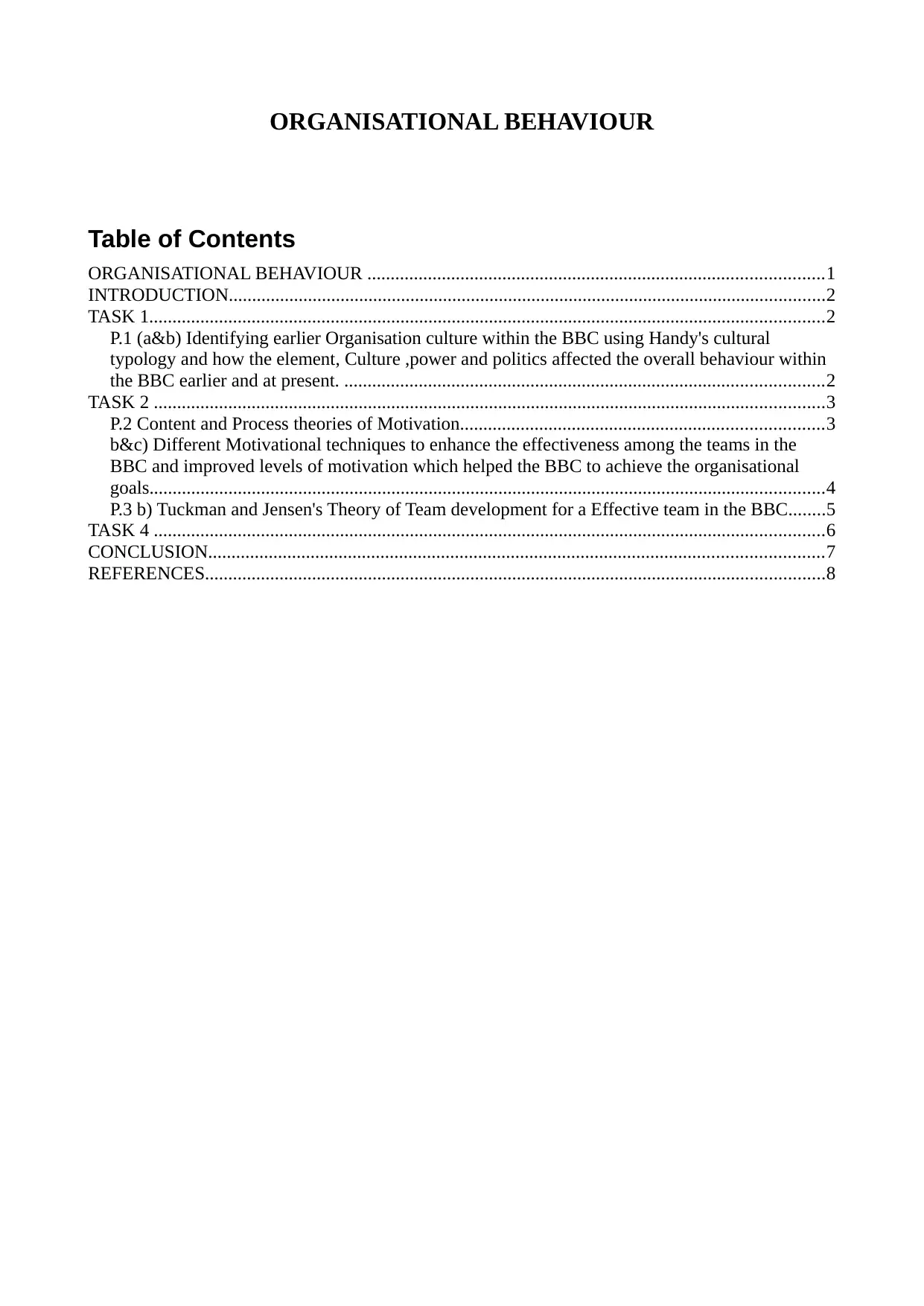
ORGANISATIONAL BEHAVIOUR
Table of Contents
ORGANISATIONAL BEHAVIOUR ..................................................................................................1
INTRODUCTION................................................................................................................................2
TASK 1.................................................................................................................................................2
P.1 (a&b) Identifying earlier Organisation culture within the BBC using Handy's cultural
typology and how the element, Culture ,power and politics affected the overall behaviour within
the BBC earlier and at present. .......................................................................................................2
TASK 2 ................................................................................................................................................3
P.2 Content and Process theories of Motivation..............................................................................3
b&c) Different Motivational techniques to enhance the effectiveness among the teams in the
BBC and improved levels of motivation which helped the BBC to achieve the organisational
goals.................................................................................................................................................4
P.3 b) Tuckman and Jensen's Theory of Team development for a Effective team in the BBC........5
TASK 4 ................................................................................................................................................6
CONCLUSION....................................................................................................................................7
REFERENCES.....................................................................................................................................8
Table of Contents
ORGANISATIONAL BEHAVIOUR ..................................................................................................1
INTRODUCTION................................................................................................................................2
TASK 1.................................................................................................................................................2
P.1 (a&b) Identifying earlier Organisation culture within the BBC using Handy's cultural
typology and how the element, Culture ,power and politics affected the overall behaviour within
the BBC earlier and at present. .......................................................................................................2
TASK 2 ................................................................................................................................................3
P.2 Content and Process theories of Motivation..............................................................................3
b&c) Different Motivational techniques to enhance the effectiveness among the teams in the
BBC and improved levels of motivation which helped the BBC to achieve the organisational
goals.................................................................................................................................................4
P.3 b) Tuckman and Jensen's Theory of Team development for a Effective team in the BBC........5
TASK 4 ................................................................................................................................................6
CONCLUSION....................................................................................................................................7
REFERENCES.....................................................................................................................................8
Paraphrase This Document
Need a fresh take? Get an instant paraphrase of this document with our AI Paraphraser
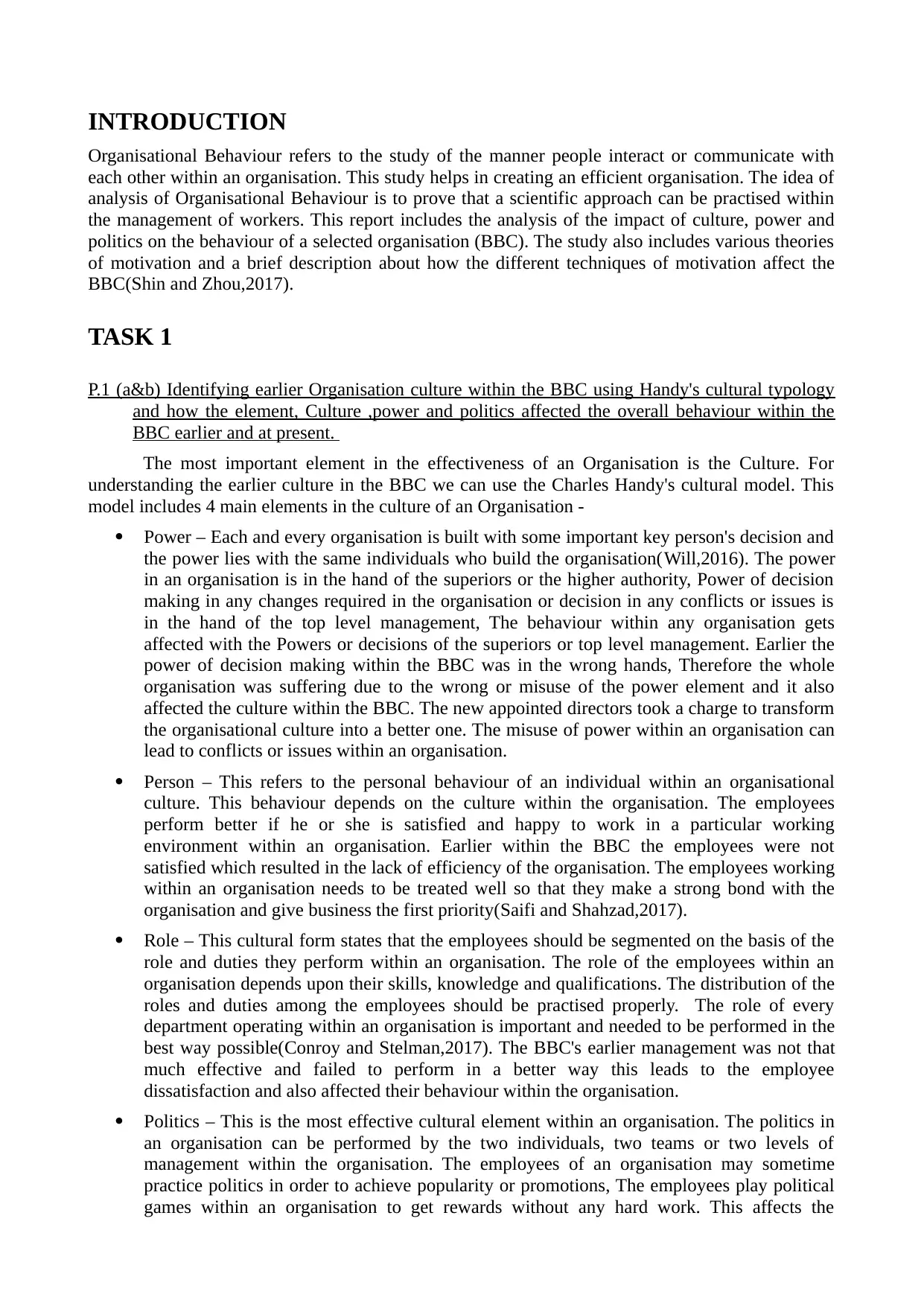
INTRODUCTION
Organisational Behaviour refers to the study of the manner people interact or communicate with
each other within an organisation. This study helps in creating an efficient organisation. The idea of
analysis of Organisational Behaviour is to prove that a scientific approach can be practised within
the management of workers. This report includes the analysis of the impact of culture, power and
politics on the behaviour of a selected organisation (BBC). The study also includes various theories
of motivation and a brief description about how the different techniques of motivation affect the
BBC(Shin and Zhou,2017).
TASK 1
P.1 (a&b) Identifying earlier Organisation culture within the BBC using Handy's cultural typology
and how the element, Culture ,power and politics affected the overall behaviour within the
BBC earlier and at present.
The most important element in the effectiveness of an Organisation is the Culture. For
understanding the earlier culture in the BBC we can use the Charles Handy's cultural model. This
model includes 4 main elements in the culture of an Organisation -
Power – Each and every organisation is built with some important key person's decision and
the power lies with the same individuals who build the organisation(Will,2016). The power
in an organisation is in the hand of the superiors or the higher authority, Power of decision
making in any changes required in the organisation or decision in any conflicts or issues is
in the hand of the top level management, The behaviour within any organisation gets
affected with the Powers or decisions of the superiors or top level management. Earlier the
power of decision making within the BBC was in the wrong hands, Therefore the whole
organisation was suffering due to the wrong or misuse of the power element and it also
affected the culture within the BBC. The new appointed directors took a charge to transform
the organisational culture into a better one. The misuse of power within an organisation can
lead to conflicts or issues within an organisation.
Person – This refers to the personal behaviour of an individual within an organisational
culture. This behaviour depends on the culture within the organisation. The employees
perform better if he or she is satisfied and happy to work in a particular working
environment within an organisation. Earlier within the BBC the employees were not
satisfied which resulted in the lack of efficiency of the organisation. The employees working
within an organisation needs to be treated well so that they make a strong bond with the
organisation and give business the first priority(Saifi and Shahzad,2017).
Role – This cultural form states that the employees should be segmented on the basis of the
role and duties they perform within an organisation. The role of the employees within an
organisation depends upon their skills, knowledge and qualifications. The distribution of the
roles and duties among the employees should be practised properly. The role of every
department operating within an organisation is important and needed to be performed in the
best way possible(Conroy and Stelman,2017). The BBC's earlier management was not that
much effective and failed to perform in a better way this leads to the employee
dissatisfaction and also affected their behaviour within the organisation.
Politics – This is the most effective cultural element within an organisation. The politics in
an organisation can be performed by the two individuals, two teams or two levels of
management within the organisation. The employees of an organisation may sometime
practice politics in order to achieve popularity or promotions, The employees play political
games within an organisation to get rewards without any hard work. This affects the
Organisational Behaviour refers to the study of the manner people interact or communicate with
each other within an organisation. This study helps in creating an efficient organisation. The idea of
analysis of Organisational Behaviour is to prove that a scientific approach can be practised within
the management of workers. This report includes the analysis of the impact of culture, power and
politics on the behaviour of a selected organisation (BBC). The study also includes various theories
of motivation and a brief description about how the different techniques of motivation affect the
BBC(Shin and Zhou,2017).
TASK 1
P.1 (a&b) Identifying earlier Organisation culture within the BBC using Handy's cultural typology
and how the element, Culture ,power and politics affected the overall behaviour within the
BBC earlier and at present.
The most important element in the effectiveness of an Organisation is the Culture. For
understanding the earlier culture in the BBC we can use the Charles Handy's cultural model. This
model includes 4 main elements in the culture of an Organisation -
Power – Each and every organisation is built with some important key person's decision and
the power lies with the same individuals who build the organisation(Will,2016). The power
in an organisation is in the hand of the superiors or the higher authority, Power of decision
making in any changes required in the organisation or decision in any conflicts or issues is
in the hand of the top level management, The behaviour within any organisation gets
affected with the Powers or decisions of the superiors or top level management. Earlier the
power of decision making within the BBC was in the wrong hands, Therefore the whole
organisation was suffering due to the wrong or misuse of the power element and it also
affected the culture within the BBC. The new appointed directors took a charge to transform
the organisational culture into a better one. The misuse of power within an organisation can
lead to conflicts or issues within an organisation.
Person – This refers to the personal behaviour of an individual within an organisational
culture. This behaviour depends on the culture within the organisation. The employees
perform better if he or she is satisfied and happy to work in a particular working
environment within an organisation. Earlier within the BBC the employees were not
satisfied which resulted in the lack of efficiency of the organisation. The employees working
within an organisation needs to be treated well so that they make a strong bond with the
organisation and give business the first priority(Saifi and Shahzad,2017).
Role – This cultural form states that the employees should be segmented on the basis of the
role and duties they perform within an organisation. The role of the employees within an
organisation depends upon their skills, knowledge and qualifications. The distribution of the
roles and duties among the employees should be practised properly. The role of every
department operating within an organisation is important and needed to be performed in the
best way possible(Conroy and Stelman,2017). The BBC's earlier management was not that
much effective and failed to perform in a better way this leads to the employee
dissatisfaction and also affected their behaviour within the organisation.
Politics – This is the most effective cultural element within an organisation. The politics in
an organisation can be performed by the two individuals, two teams or two levels of
management within the organisation. The employees of an organisation may sometime
practice politics in order to achieve popularity or promotions, The employees play political
games within an organisation to get rewards without any hard work. This affects the
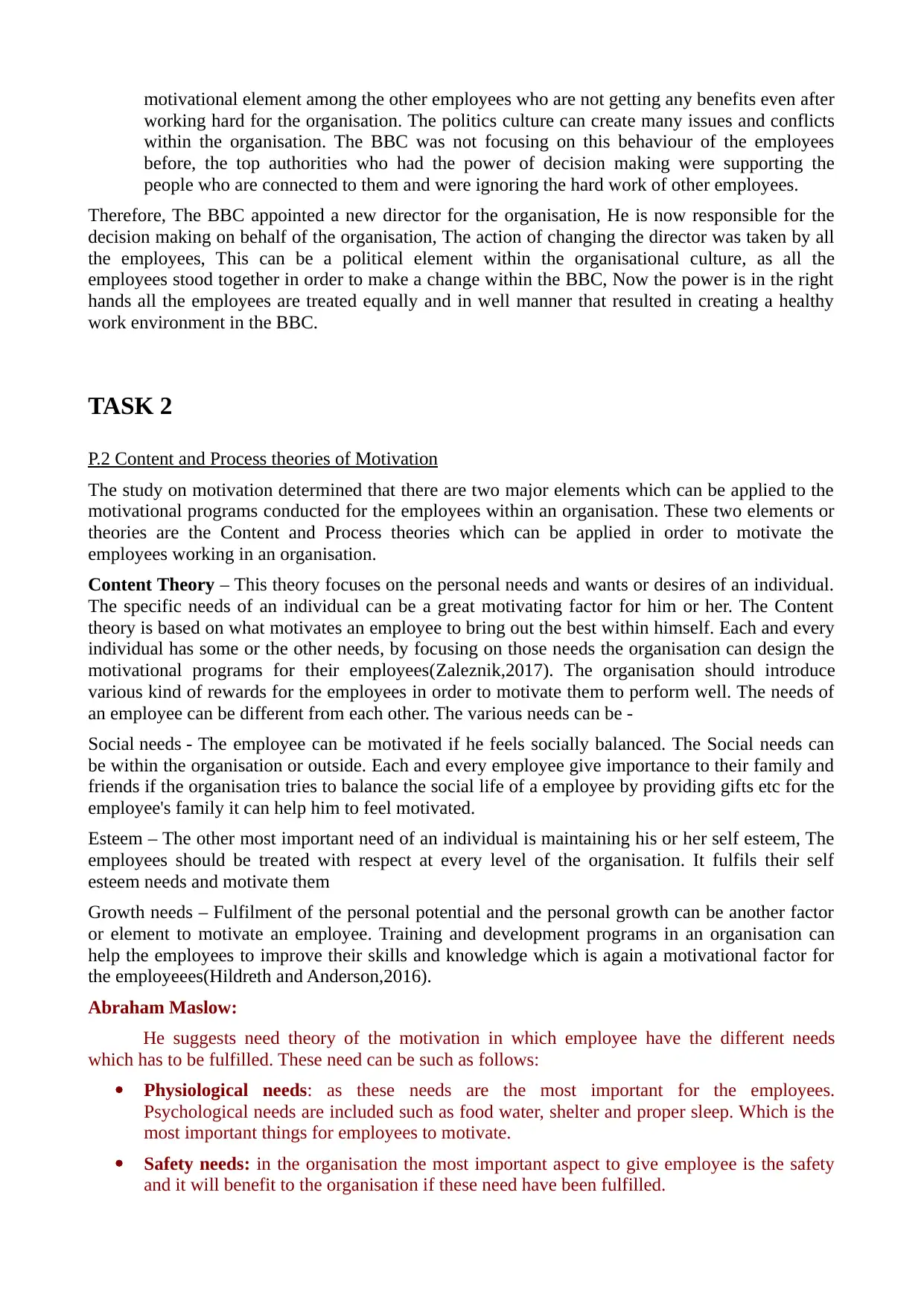
motivational element among the other employees who are not getting any benefits even after
working hard for the organisation. The politics culture can create many issues and conflicts
within the organisation. The BBC was not focusing on this behaviour of the employees
before, the top authorities who had the power of decision making were supporting the
people who are connected to them and were ignoring the hard work of other employees.
Therefore, The BBC appointed a new director for the organisation, He is now responsible for the
decision making on behalf of the organisation, The action of changing the director was taken by all
the employees, This can be a political element within the organisational culture, as all the
employees stood together in order to make a change within the BBC, Now the power is in the right
hands all the employees are treated equally and in well manner that resulted in creating a healthy
work environment in the BBC.
TASK 2
P.2 Content and Process theories of Motivation
The study on motivation determined that there are two major elements which can be applied to the
motivational programs conducted for the employees within an organisation. These two elements or
theories are the Content and Process theories which can be applied in order to motivate the
employees working in an organisation.
Content Theory – This theory focuses on the personal needs and wants or desires of an individual.
The specific needs of an individual can be a great motivating factor for him or her. The Content
theory is based on what motivates an employee to bring out the best within himself. Each and every
individual has some or the other needs, by focusing on those needs the organisation can design the
motivational programs for their employees(Zaleznik,2017). The organisation should introduce
various kind of rewards for the employees in order to motivate them to perform well. The needs of
an employee can be different from each other. The various needs can be -
Social needs - The employee can be motivated if he feels socially balanced. The Social needs can
be within the organisation or outside. Each and every employee give importance to their family and
friends if the organisation tries to balance the social life of a employee by providing gifts etc for the
employee's family it can help him to feel motivated.
Esteem – The other most important need of an individual is maintaining his or her self esteem, The
employees should be treated with respect at every level of the organisation. It fulfils their self
esteem needs and motivate them
Growth needs – Fulfilment of the personal potential and the personal growth can be another factor
or element to motivate an employee. Training and development programs in an organisation can
help the employees to improve their skills and knowledge which is again a motivational factor for
the employeees(Hildreth and Anderson,2016).
Abraham Maslow:
He suggests need theory of the motivation in which employee have the different needs
which has to be fulfilled. These need can be such as follows:
Physiological needs: as these needs are the most important for the employees.
Psychological needs are included such as food water, shelter and proper sleep. Which is the
most important things for employees to motivate.
Safety needs: in the organisation the most important aspect to give employee is the safety
and it will benefit to the organisation if these need have been fulfilled.
working hard for the organisation. The politics culture can create many issues and conflicts
within the organisation. The BBC was not focusing on this behaviour of the employees
before, the top authorities who had the power of decision making were supporting the
people who are connected to them and were ignoring the hard work of other employees.
Therefore, The BBC appointed a new director for the organisation, He is now responsible for the
decision making on behalf of the organisation, The action of changing the director was taken by all
the employees, This can be a political element within the organisational culture, as all the
employees stood together in order to make a change within the BBC, Now the power is in the right
hands all the employees are treated equally and in well manner that resulted in creating a healthy
work environment in the BBC.
TASK 2
P.2 Content and Process theories of Motivation
The study on motivation determined that there are two major elements which can be applied to the
motivational programs conducted for the employees within an organisation. These two elements or
theories are the Content and Process theories which can be applied in order to motivate the
employees working in an organisation.
Content Theory – This theory focuses on the personal needs and wants or desires of an individual.
The specific needs of an individual can be a great motivating factor for him or her. The Content
theory is based on what motivates an employee to bring out the best within himself. Each and every
individual has some or the other needs, by focusing on those needs the organisation can design the
motivational programs for their employees(Zaleznik,2017). The organisation should introduce
various kind of rewards for the employees in order to motivate them to perform well. The needs of
an employee can be different from each other. The various needs can be -
Social needs - The employee can be motivated if he feels socially balanced. The Social needs can
be within the organisation or outside. Each and every employee give importance to their family and
friends if the organisation tries to balance the social life of a employee by providing gifts etc for the
employee's family it can help him to feel motivated.
Esteem – The other most important need of an individual is maintaining his or her self esteem, The
employees should be treated with respect at every level of the organisation. It fulfils their self
esteem needs and motivate them
Growth needs – Fulfilment of the personal potential and the personal growth can be another factor
or element to motivate an employee. Training and development programs in an organisation can
help the employees to improve their skills and knowledge which is again a motivational factor for
the employeees(Hildreth and Anderson,2016).
Abraham Maslow:
He suggests need theory of the motivation in which employee have the different needs
which has to be fulfilled. These need can be such as follows:
Physiological needs: as these needs are the most important for the employees.
Psychological needs are included such as food water, shelter and proper sleep. Which is the
most important things for employees to motivate.
Safety needs: in the organisation the most important aspect to give employee is the safety
and it will benefit to the organisation if these need have been fulfilled.
⊘ This is a preview!⊘
Do you want full access?
Subscribe today to unlock all pages.

Trusted by 1+ million students worldwide
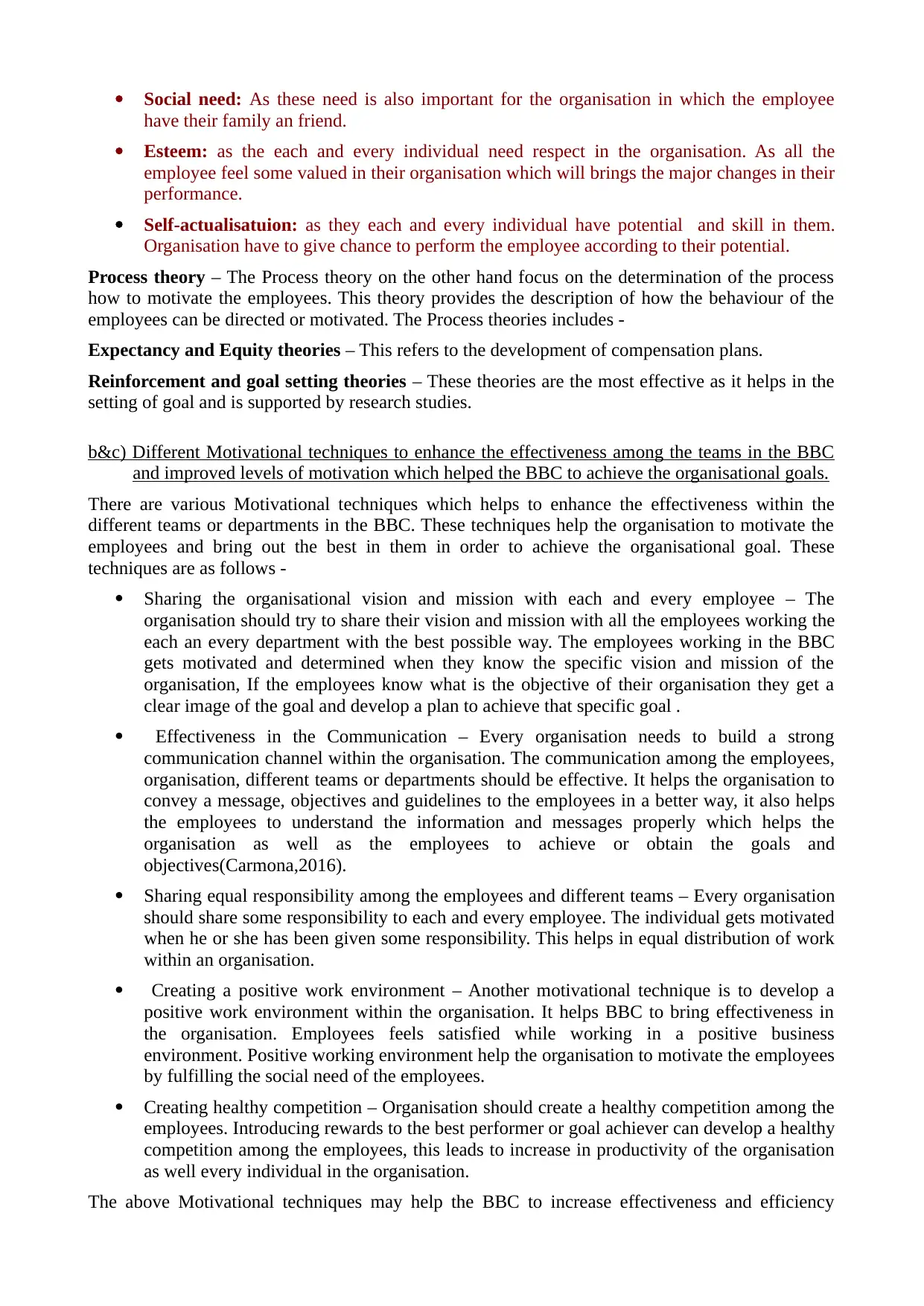
Social need: As these need is also important for the organisation in which the employee
have their family an friend.
Esteem: as the each and every individual need respect in the organisation. As all the
employee feel some valued in their organisation which will brings the major changes in their
performance.
Self-actualisatuion: as they each and every individual have potential and skill in them.
Organisation have to give chance to perform the employee according to their potential.
Process theory – The Process theory on the other hand focus on the determination of the process
how to motivate the employees. This theory provides the description of how the behaviour of the
employees can be directed or motivated. The Process theories includes -
Expectancy and Equity theories – This refers to the development of compensation plans.
Reinforcement and goal setting theories – These theories are the most effective as it helps in the
setting of goal and is supported by research studies.
b&c) Different Motivational techniques to enhance the effectiveness among the teams in the BBC
and improved levels of motivation which helped the BBC to achieve the organisational goals.
There are various Motivational techniques which helps to enhance the effectiveness within the
different teams or departments in the BBC. These techniques help the organisation to motivate the
employees and bring out the best in them in order to achieve the organisational goal. These
techniques are as follows -
Sharing the organisational vision and mission with each and every employee – The
organisation should try to share their vision and mission with all the employees working the
each an every department with the best possible way. The employees working in the BBC
gets motivated and determined when they know the specific vision and mission of the
organisation, If the employees know what is the objective of their organisation they get a
clear image of the goal and develop a plan to achieve that specific goal .
Effectiveness in the Communication – Every organisation needs to build a strong
communication channel within the organisation. The communication among the employees,
organisation, different teams or departments should be effective. It helps the organisation to
convey a message, objectives and guidelines to the employees in a better way, it also helps
the employees to understand the information and messages properly which helps the
organisation as well as the employees to achieve or obtain the goals and
objectives(Carmona,2016).
Sharing equal responsibility among the employees and different teams – Every organisation
should share some responsibility to each and every employee. The individual gets motivated
when he or she has been given some responsibility. This helps in equal distribution of work
within an organisation.
Creating a positive work environment – Another motivational technique is to develop a
positive work environment within the organisation. It helps BBC to bring effectiveness in
the organisation. Employees feels satisfied while working in a positive business
environment. Positive working environment help the organisation to motivate the employees
by fulfilling the social need of the employees.
Creating healthy competition – Organisation should create a healthy competition among the
employees. Introducing rewards to the best performer or goal achiever can develop a healthy
competition among the employees, this leads to increase in productivity of the organisation
as well every individual in the organisation.
The above Motivational techniques may help the BBC to increase effectiveness and efficiency
have their family an friend.
Esteem: as the each and every individual need respect in the organisation. As all the
employee feel some valued in their organisation which will brings the major changes in their
performance.
Self-actualisatuion: as they each and every individual have potential and skill in them.
Organisation have to give chance to perform the employee according to their potential.
Process theory – The Process theory on the other hand focus on the determination of the process
how to motivate the employees. This theory provides the description of how the behaviour of the
employees can be directed or motivated. The Process theories includes -
Expectancy and Equity theories – This refers to the development of compensation plans.
Reinforcement and goal setting theories – These theories are the most effective as it helps in the
setting of goal and is supported by research studies.
b&c) Different Motivational techniques to enhance the effectiveness among the teams in the BBC
and improved levels of motivation which helped the BBC to achieve the organisational goals.
There are various Motivational techniques which helps to enhance the effectiveness within the
different teams or departments in the BBC. These techniques help the organisation to motivate the
employees and bring out the best in them in order to achieve the organisational goal. These
techniques are as follows -
Sharing the organisational vision and mission with each and every employee – The
organisation should try to share their vision and mission with all the employees working the
each an every department with the best possible way. The employees working in the BBC
gets motivated and determined when they know the specific vision and mission of the
organisation, If the employees know what is the objective of their organisation they get a
clear image of the goal and develop a plan to achieve that specific goal .
Effectiveness in the Communication – Every organisation needs to build a strong
communication channel within the organisation. The communication among the employees,
organisation, different teams or departments should be effective. It helps the organisation to
convey a message, objectives and guidelines to the employees in a better way, it also helps
the employees to understand the information and messages properly which helps the
organisation as well as the employees to achieve or obtain the goals and
objectives(Carmona,2016).
Sharing equal responsibility among the employees and different teams – Every organisation
should share some responsibility to each and every employee. The individual gets motivated
when he or she has been given some responsibility. This helps in equal distribution of work
within an organisation.
Creating a positive work environment – Another motivational technique is to develop a
positive work environment within the organisation. It helps BBC to bring effectiveness in
the organisation. Employees feels satisfied while working in a positive business
environment. Positive working environment help the organisation to motivate the employees
by fulfilling the social need of the employees.
Creating healthy competition – Organisation should create a healthy competition among the
employees. Introducing rewards to the best performer or goal achiever can develop a healthy
competition among the employees, this leads to increase in productivity of the organisation
as well every individual in the organisation.
The above Motivational techniques may help the BBC to increase effectiveness and efficiency
Paraphrase This Document
Need a fresh take? Get an instant paraphrase of this document with our AI Paraphraser
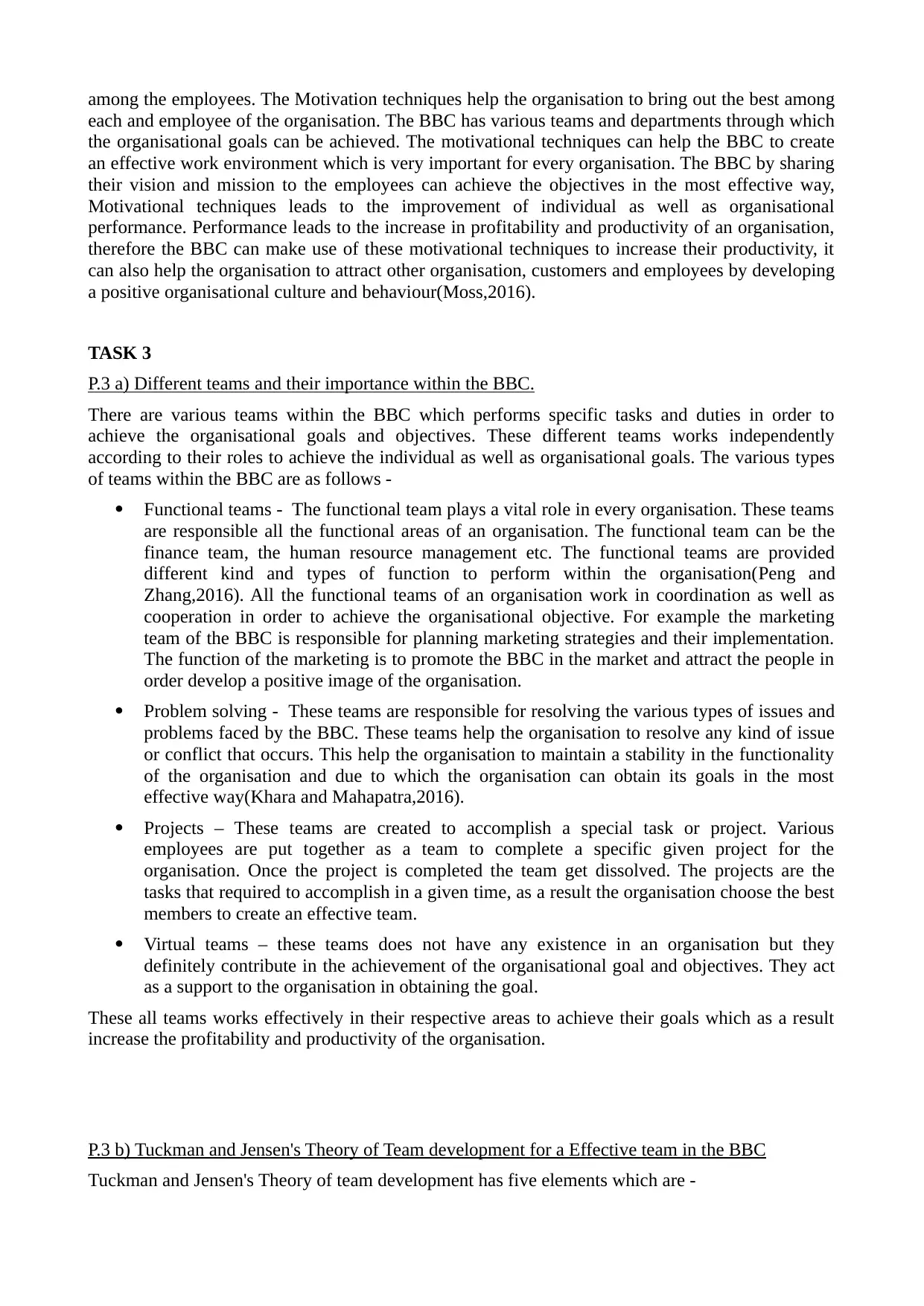
among the employees. The Motivation techniques help the organisation to bring out the best among
each and employee of the organisation. The BBC has various teams and departments through which
the organisational goals can be achieved. The motivational techniques can help the BBC to create
an effective work environment which is very important for every organisation. The BBC by sharing
their vision and mission to the employees can achieve the objectives in the most effective way,
Motivational techniques leads to the improvement of individual as well as organisational
performance. Performance leads to the increase in profitability and productivity of an organisation,
therefore the BBC can make use of these motivational techniques to increase their productivity, it
can also help the organisation to attract other organisation, customers and employees by developing
a positive organisational culture and behaviour(Moss,2016).
TASK 3
P.3 a) Different teams and their importance within the BBC.
There are various teams within the BBC which performs specific tasks and duties in order to
achieve the organisational goals and objectives. These different teams works independently
according to their roles to achieve the individual as well as organisational goals. The various types
of teams within the BBC are as follows -
Functional teams - The functional team plays a vital role in every organisation. These teams
are responsible all the functional areas of an organisation. The functional team can be the
finance team, the human resource management etc. The functional teams are provided
different kind and types of function to perform within the organisation(Peng and
Zhang,2016). All the functional teams of an organisation work in coordination as well as
cooperation in order to achieve the organisational objective. For example the marketing
team of the BBC is responsible for planning marketing strategies and their implementation.
The function of the marketing is to promote the BBC in the market and attract the people in
order develop a positive image of the organisation.
Problem solving - These teams are responsible for resolving the various types of issues and
problems faced by the BBC. These teams help the organisation to resolve any kind of issue
or conflict that occurs. This help the organisation to maintain a stability in the functionality
of the organisation and due to which the organisation can obtain its goals in the most
effective way(Khara and Mahapatra,2016).
Projects – These teams are created to accomplish a special task or project. Various
employees are put together as a team to complete a specific given project for the
organisation. Once the project is completed the team get dissolved. The projects are the
tasks that required to accomplish in a given time, as a result the organisation choose the best
members to create an effective team.
Virtual teams – these teams does not have any existence in an organisation but they
definitely contribute in the achievement of the organisational goal and objectives. They act
as a support to the organisation in obtaining the goal.
These all teams works effectively in their respective areas to achieve their goals which as a result
increase the profitability and productivity of the organisation.
P.3 b) Tuckman and Jensen's Theory of Team development for a Effective team in the BBC
Tuckman and Jensen's Theory of team development has five elements which are -
each and employee of the organisation. The BBC has various teams and departments through which
the organisational goals can be achieved. The motivational techniques can help the BBC to create
an effective work environment which is very important for every organisation. The BBC by sharing
their vision and mission to the employees can achieve the objectives in the most effective way,
Motivational techniques leads to the improvement of individual as well as organisational
performance. Performance leads to the increase in profitability and productivity of an organisation,
therefore the BBC can make use of these motivational techniques to increase their productivity, it
can also help the organisation to attract other organisation, customers and employees by developing
a positive organisational culture and behaviour(Moss,2016).
TASK 3
P.3 a) Different teams and their importance within the BBC.
There are various teams within the BBC which performs specific tasks and duties in order to
achieve the organisational goals and objectives. These different teams works independently
according to their roles to achieve the individual as well as organisational goals. The various types
of teams within the BBC are as follows -
Functional teams - The functional team plays a vital role in every organisation. These teams
are responsible all the functional areas of an organisation. The functional team can be the
finance team, the human resource management etc. The functional teams are provided
different kind and types of function to perform within the organisation(Peng and
Zhang,2016). All the functional teams of an organisation work in coordination as well as
cooperation in order to achieve the organisational objective. For example the marketing
team of the BBC is responsible for planning marketing strategies and their implementation.
The function of the marketing is to promote the BBC in the market and attract the people in
order develop a positive image of the organisation.
Problem solving - These teams are responsible for resolving the various types of issues and
problems faced by the BBC. These teams help the organisation to resolve any kind of issue
or conflict that occurs. This help the organisation to maintain a stability in the functionality
of the organisation and due to which the organisation can obtain its goals in the most
effective way(Khara and Mahapatra,2016).
Projects – These teams are created to accomplish a special task or project. Various
employees are put together as a team to complete a specific given project for the
organisation. Once the project is completed the team get dissolved. The projects are the
tasks that required to accomplish in a given time, as a result the organisation choose the best
members to create an effective team.
Virtual teams – these teams does not have any existence in an organisation but they
definitely contribute in the achievement of the organisational goal and objectives. They act
as a support to the organisation in obtaining the goal.
These all teams works effectively in their respective areas to achieve their goals which as a result
increase the profitability and productivity of the organisation.
P.3 b) Tuckman and Jensen's Theory of Team development for a Effective team in the BBC
Tuckman and Jensen's Theory of team development has five elements which are -
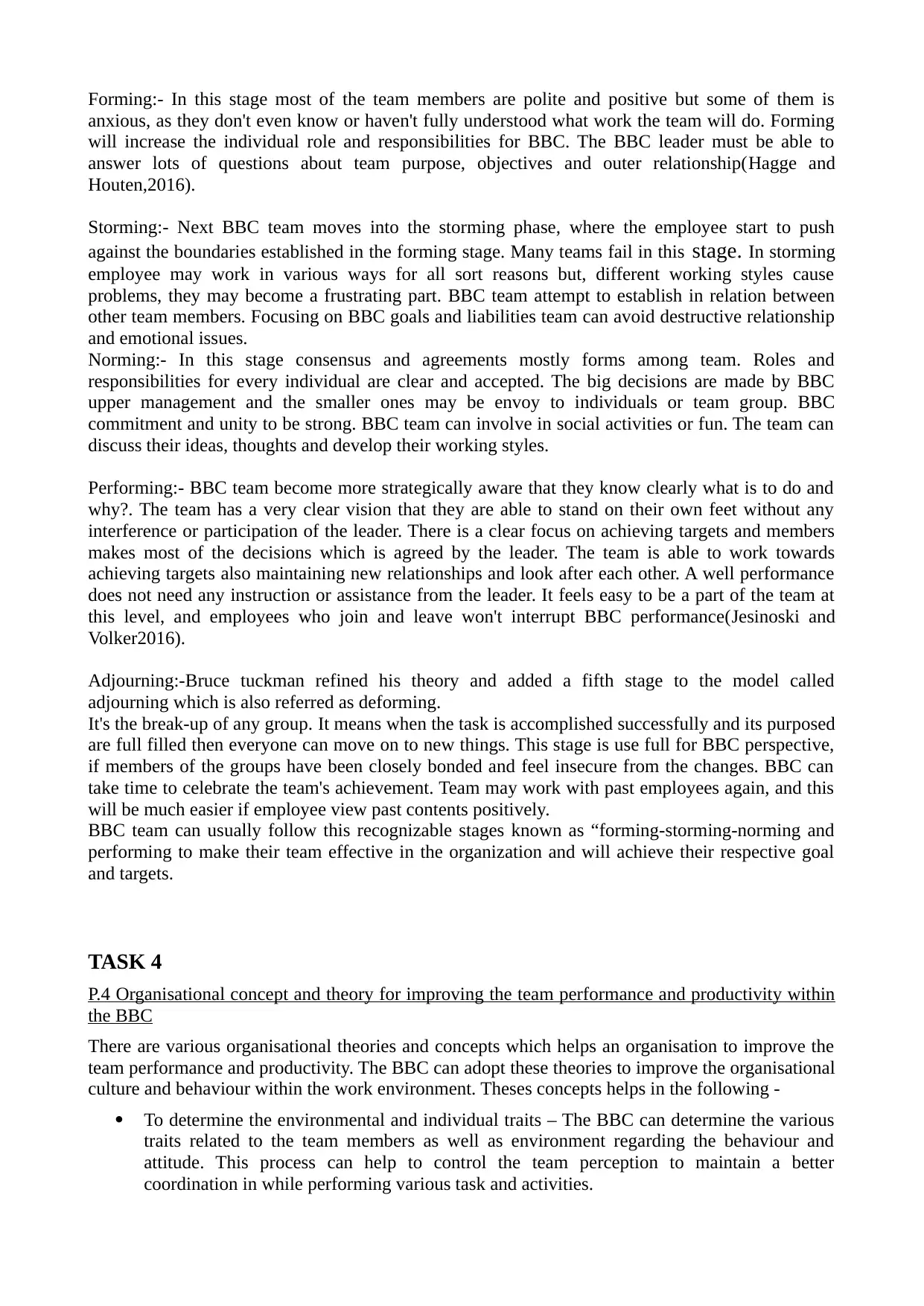
Forming:- In this stage most of the team members are polite and positive but some of them is
anxious, as they don't even know or haven't fully understood what work the team will do. Forming
will increase the individual role and responsibilities for BBC. The BBC leader must be able to
answer lots of questions about team purpose, objectives and outer relationship(Hagge and
Houten,2016).
Storming:- Next BBC team moves into the storming phase, where the employee start to push
against the boundaries established in the forming stage. Many teams fail in this stage. In storming
employee may work in various ways for all sort reasons but, different working styles cause
problems, they may become a frustrating part. BBC team attempt to establish in relation between
other team members. Focusing on BBC goals and liabilities team can avoid destructive relationship
and emotional issues.
Norming:- In this stage consensus and agreements mostly forms among team. Roles and
responsibilities for every individual are clear and accepted. The big decisions are made by BBC
upper management and the smaller ones may be envoy to individuals or team group. BBC
commitment and unity to be strong. BBC team can involve in social activities or fun. The team can
discuss their ideas, thoughts and develop their working styles.
Performing:- BBC team become more strategically aware that they know clearly what is to do and
why?. The team has a very clear vision that they are able to stand on their own feet without any
interference or participation of the leader. There is a clear focus on achieving targets and members
makes most of the decisions which is agreed by the leader. The team is able to work towards
achieving targets also maintaining new relationships and look after each other. A well performance
does not need any instruction or assistance from the leader. It feels easy to be a part of the team at
this level, and employees who join and leave won't interrupt BBC performance(Jesinoski and
Volker2016).
Adjourning:-Bruce tuckman refined his theory and added a fifth stage to the model called
adjourning which is also referred as deforming.
It's the break-up of any group. It means when the task is accomplished successfully and its purposed
are full filled then everyone can move on to new things. This stage is use full for BBC perspective,
if members of the groups have been closely bonded and feel insecure from the changes. BBC can
take time to celebrate the team's achievement. Team may work with past employees again, and this
will be much easier if employee view past contents positively.
BBC team can usually follow this recognizable stages known as “forming-storming-norming and
performing to make their team effective in the organization and will achieve their respective goal
and targets.
TASK 4
P.4 Organisational concept and theory for improving the team performance and productivity within
the BBC
There are various organisational theories and concepts which helps an organisation to improve the
team performance and productivity. The BBC can adopt these theories to improve the organisational
culture and behaviour within the work environment. Theses concepts helps in the following -
To determine the environmental and individual traits – The BBC can determine the various
traits related to the team members as well as environment regarding the behaviour and
attitude. This process can help to control the team perception to maintain a better
coordination in while performing various task and activities.
anxious, as they don't even know or haven't fully understood what work the team will do. Forming
will increase the individual role and responsibilities for BBC. The BBC leader must be able to
answer lots of questions about team purpose, objectives and outer relationship(Hagge and
Houten,2016).
Storming:- Next BBC team moves into the storming phase, where the employee start to push
against the boundaries established in the forming stage. Many teams fail in this stage. In storming
employee may work in various ways for all sort reasons but, different working styles cause
problems, they may become a frustrating part. BBC team attempt to establish in relation between
other team members. Focusing on BBC goals and liabilities team can avoid destructive relationship
and emotional issues.
Norming:- In this stage consensus and agreements mostly forms among team. Roles and
responsibilities for every individual are clear and accepted. The big decisions are made by BBC
upper management and the smaller ones may be envoy to individuals or team group. BBC
commitment and unity to be strong. BBC team can involve in social activities or fun. The team can
discuss their ideas, thoughts and develop their working styles.
Performing:- BBC team become more strategically aware that they know clearly what is to do and
why?. The team has a very clear vision that they are able to stand on their own feet without any
interference or participation of the leader. There is a clear focus on achieving targets and members
makes most of the decisions which is agreed by the leader. The team is able to work towards
achieving targets also maintaining new relationships and look after each other. A well performance
does not need any instruction or assistance from the leader. It feels easy to be a part of the team at
this level, and employees who join and leave won't interrupt BBC performance(Jesinoski and
Volker2016).
Adjourning:-Bruce tuckman refined his theory and added a fifth stage to the model called
adjourning which is also referred as deforming.
It's the break-up of any group. It means when the task is accomplished successfully and its purposed
are full filled then everyone can move on to new things. This stage is use full for BBC perspective,
if members of the groups have been closely bonded and feel insecure from the changes. BBC can
take time to celebrate the team's achievement. Team may work with past employees again, and this
will be much easier if employee view past contents positively.
BBC team can usually follow this recognizable stages known as “forming-storming-norming and
performing to make their team effective in the organization and will achieve their respective goal
and targets.
TASK 4
P.4 Organisational concept and theory for improving the team performance and productivity within
the BBC
There are various organisational theories and concepts which helps an organisation to improve the
team performance and productivity. The BBC can adopt these theories to improve the organisational
culture and behaviour within the work environment. Theses concepts helps in the following -
To determine the environmental and individual traits – The BBC can determine the various
traits related to the team members as well as environment regarding the behaviour and
attitude. This process can help to control the team perception to maintain a better
coordination in while performing various task and activities.
⊘ This is a preview!⊘
Do you want full access?
Subscribe today to unlock all pages.

Trusted by 1+ million students worldwide
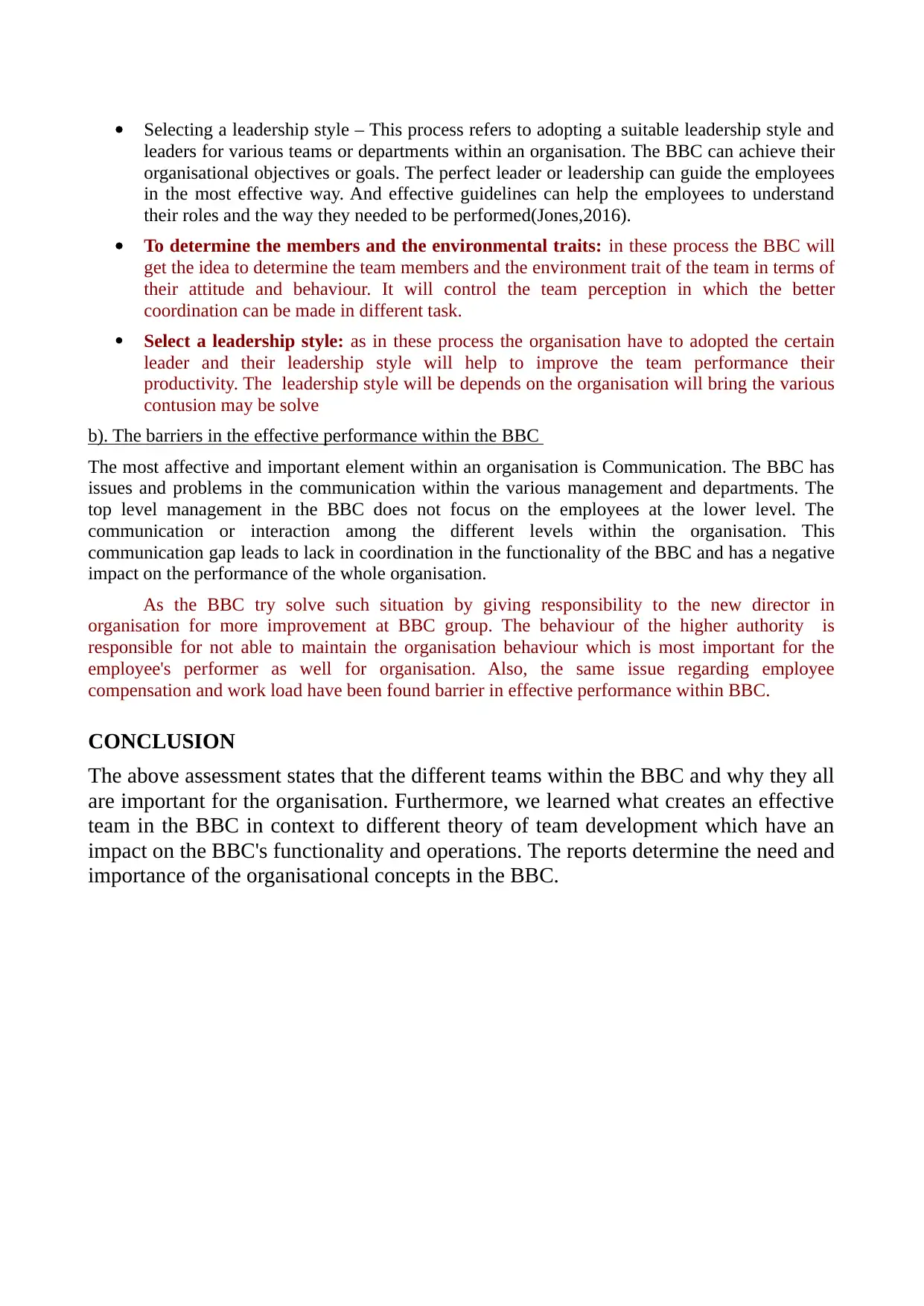
Selecting a leadership style – This process refers to adopting a suitable leadership style and
leaders for various teams or departments within an organisation. The BBC can achieve their
organisational objectives or goals. The perfect leader or leadership can guide the employees
in the most effective way. And effective guidelines can help the employees to understand
their roles and the way they needed to be performed(Jones,2016).
To determine the members and the environmental traits: in these process the BBC will
get the idea to determine the team members and the environment trait of the team in terms of
their attitude and behaviour. It will control the team perception in which the better
coordination can be made in different task.
Select a leadership style: as in these process the organisation have to adopted the certain
leader and their leadership style will help to improve the team performance their
productivity. The leadership style will be depends on the organisation will bring the various
contusion may be solve
b). The barriers in the effective performance within the BBC
The most affective and important element within an organisation is Communication. The BBC has
issues and problems in the communication within the various management and departments. The
top level management in the BBC does not focus on the employees at the lower level. The
communication or interaction among the different levels within the organisation. This
communication gap leads to lack in coordination in the functionality of the BBC and has a negative
impact on the performance of the whole organisation.
As the BBC try solve such situation by giving responsibility to the new director in
organisation for more improvement at BBC group. The behaviour of the higher authority is
responsible for not able to maintain the organisation behaviour which is most important for the
employee's performer as well for organisation. Also, the same issue regarding employee
compensation and work load have been found barrier in effective performance within BBC.
CONCLUSION
The above assessment states that the different teams within the BBC and why they all
are important for the organisation. Furthermore, we learned what creates an effective
team in the BBC in context to different theory of team development which have an
impact on the BBC's functionality and operations. The reports determine the need and
importance of the organisational concepts in the BBC.
leaders for various teams or departments within an organisation. The BBC can achieve their
organisational objectives or goals. The perfect leader or leadership can guide the employees
in the most effective way. And effective guidelines can help the employees to understand
their roles and the way they needed to be performed(Jones,2016).
To determine the members and the environmental traits: in these process the BBC will
get the idea to determine the team members and the environment trait of the team in terms of
their attitude and behaviour. It will control the team perception in which the better
coordination can be made in different task.
Select a leadership style: as in these process the organisation have to adopted the certain
leader and their leadership style will help to improve the team performance their
productivity. The leadership style will be depends on the organisation will bring the various
contusion may be solve
b). The barriers in the effective performance within the BBC
The most affective and important element within an organisation is Communication. The BBC has
issues and problems in the communication within the various management and departments. The
top level management in the BBC does not focus on the employees at the lower level. The
communication or interaction among the different levels within the organisation. This
communication gap leads to lack in coordination in the functionality of the BBC and has a negative
impact on the performance of the whole organisation.
As the BBC try solve such situation by giving responsibility to the new director in
organisation for more improvement at BBC group. The behaviour of the higher authority is
responsible for not able to maintain the organisation behaviour which is most important for the
employee's performer as well for organisation. Also, the same issue regarding employee
compensation and work load have been found barrier in effective performance within BBC.
CONCLUSION
The above assessment states that the different teams within the BBC and why they all
are important for the organisation. Furthermore, we learned what creates an effective
team in the BBC in context to different theory of team development which have an
impact on the BBC's functionality and operations. The reports determine the need and
importance of the organisational concepts in the BBC.
Paraphrase This Document
Need a fresh take? Get an instant paraphrase of this document with our AI Paraphraser
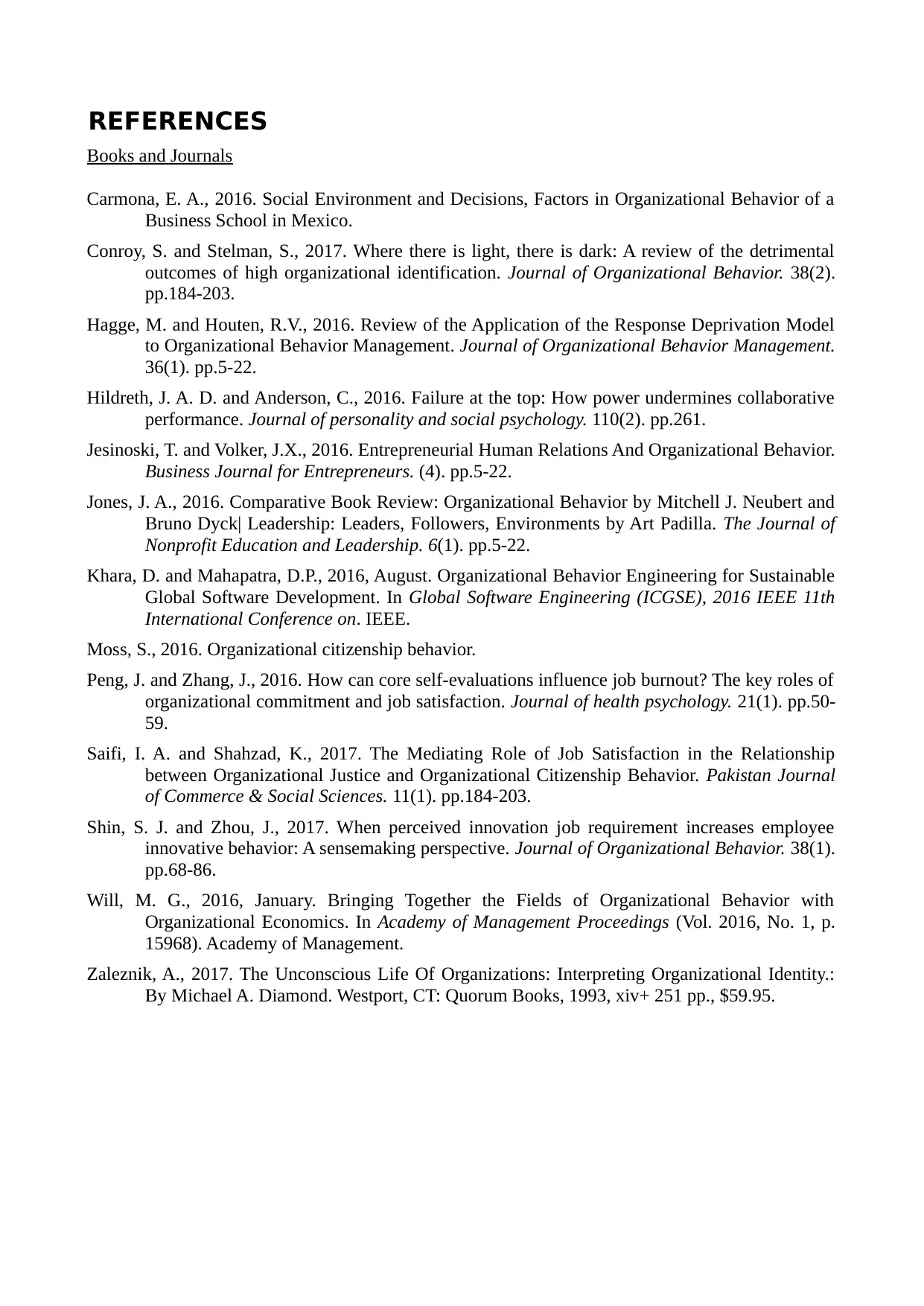
REFERENCES
Books and Journals
Carmona, E. A., 2016. Social Environment and Decisions, Factors in Organizational Behavior of a
Business School in Mexico.
Conroy, S. and Stelman, S., 2017. Where there is light, there is dark: A review of the detrimental
outcomes of high organizational identification. Journal of Organizational Behavior. 38(2).
pp.184-203.
Hagge, M. and Houten, R.V., 2016. Review of the Application of the Response Deprivation Model
to Organizational Behavior Management. Journal of Organizational Behavior Management.
36(1). pp.5-22.
Hildreth, J. A. D. and Anderson, C., 2016. Failure at the top: How power undermines collaborative
performance. Journal of personality and social psychology. 110(2). pp.261.
Jesinoski, T. and Volker, J.X., 2016. Entrepreneurial Human Relations And Organizational Behavior.
Business Journal for Entrepreneurs. (4). pp.5-22.
Jones, J. A., 2016. Comparative Book Review: Organizational Behavior by Mitchell J. Neubert and
Bruno Dyck| Leadership: Leaders, Followers, Environments by Art Padilla. The Journal of
Nonprofit Education and Leadership. 6(1). pp.5-22.
Khara, D. and Mahapatra, D.P., 2016, August. Organizational Behavior Engineering for Sustainable
Global Software Development. In Global Software Engineering (ICGSE), 2016 IEEE 11th
International Conference on. IEEE.
Moss, S., 2016. Organizational citizenship behavior.
Peng, J. and Zhang, J., 2016. How can core self-evaluations influence job burnout? The key roles of
organizational commitment and job satisfaction. Journal of health psychology. 21(1). pp.50-
59.
Saifi, I. A. and Shahzad, K., 2017. The Mediating Role of Job Satisfaction in the Relationship
between Organizational Justice and Organizational Citizenship Behavior. Pakistan Journal
of Commerce & Social Sciences. 11(1). pp.184-203.
Shin, S. J. and Zhou, J., 2017. When perceived innovation job requirement increases employee
innovative behavior: A sensemaking perspective. Journal of Organizational Behavior. 38(1).
pp.68-86.
Will, M. G., 2016, January. Bringing Together the Fields of Organizational Behavior with
Organizational Economics. In Academy of Management Proceedings (Vol. 2016, No. 1, p.
15968). Academy of Management.
Zaleznik, A., 2017. The Unconscious Life Of Organizations: Interpreting Organizational Identity.:
By Michael A. Diamond. Westport, CT: Quorum Books, 1993, xiv+ 251 pp., $59.95.
Books and Journals
Carmona, E. A., 2016. Social Environment and Decisions, Factors in Organizational Behavior of a
Business School in Mexico.
Conroy, S. and Stelman, S., 2017. Where there is light, there is dark: A review of the detrimental
outcomes of high organizational identification. Journal of Organizational Behavior. 38(2).
pp.184-203.
Hagge, M. and Houten, R.V., 2016. Review of the Application of the Response Deprivation Model
to Organizational Behavior Management. Journal of Organizational Behavior Management.
36(1). pp.5-22.
Hildreth, J. A. D. and Anderson, C., 2016. Failure at the top: How power undermines collaborative
performance. Journal of personality and social psychology. 110(2). pp.261.
Jesinoski, T. and Volker, J.X., 2016. Entrepreneurial Human Relations And Organizational Behavior.
Business Journal for Entrepreneurs. (4). pp.5-22.
Jones, J. A., 2016. Comparative Book Review: Organizational Behavior by Mitchell J. Neubert and
Bruno Dyck| Leadership: Leaders, Followers, Environments by Art Padilla. The Journal of
Nonprofit Education and Leadership. 6(1). pp.5-22.
Khara, D. and Mahapatra, D.P., 2016, August. Organizational Behavior Engineering for Sustainable
Global Software Development. In Global Software Engineering (ICGSE), 2016 IEEE 11th
International Conference on. IEEE.
Moss, S., 2016. Organizational citizenship behavior.
Peng, J. and Zhang, J., 2016. How can core self-evaluations influence job burnout? The key roles of
organizational commitment and job satisfaction. Journal of health psychology. 21(1). pp.50-
59.
Saifi, I. A. and Shahzad, K., 2017. The Mediating Role of Job Satisfaction in the Relationship
between Organizational Justice and Organizational Citizenship Behavior. Pakistan Journal
of Commerce & Social Sciences. 11(1). pp.184-203.
Shin, S. J. and Zhou, J., 2017. When perceived innovation job requirement increases employee
innovative behavior: A sensemaking perspective. Journal of Organizational Behavior. 38(1).
pp.68-86.
Will, M. G., 2016, January. Bringing Together the Fields of Organizational Behavior with
Organizational Economics. In Academy of Management Proceedings (Vol. 2016, No. 1, p.
15968). Academy of Management.
Zaleznik, A., 2017. The Unconscious Life Of Organizations: Interpreting Organizational Identity.:
By Michael A. Diamond. Westport, CT: Quorum Books, 1993, xiv+ 251 pp., $59.95.
1 out of 8
Related Documents
Your All-in-One AI-Powered Toolkit for Academic Success.
+13062052269
info@desklib.com
Available 24*7 on WhatsApp / Email
![[object Object]](/_next/static/media/star-bottom.7253800d.svg)
Unlock your academic potential
Copyright © 2020–2026 A2Z Services. All Rights Reserved. Developed and managed by ZUCOL.





